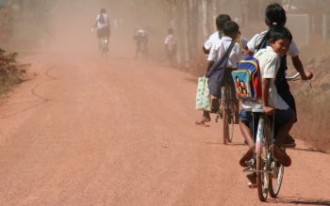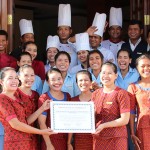
In my experience, many hoteliers do it simply because they want to do it, and being a responsible hotelier also seems to make good business sense. If people are passionate about something, then it shows in everything they do and makes for an all round great stay – and you can even make a positive difference to the local communities where you travel too.
With the increasing number of 5-star luxury resorts neighbouring local communities of wooden huts with no electricity or running water, it’s not hard to see the imbalance of wealth and poverty in Cambodia’s main tourist destination, Siem Reap. Whilst dining in fancy upmarket restaurants, shopping in Old Market or drinking coffee in swanky western-run establishments, you are never too far from kids running barefoot in the streets alongside limbless landmine victims selling books or ladies with sleeping babies begging for powdered milk. Inevitably, many travellers are often torn by their emotions and easily swayed to hand out a dollar or two to the kids with the cutest smile, but what happens when these kids grow up? With many families living below the poverty line, parents can earn more money by sending their kids on the street than sending them to school. Without education, however, these kids could end up on the streets for life, or worse.
Responsible hotels and guesthouses in Siem Reap are starting to provide positive alternatives for tourists who are battling with their consciences when walking away from the destitute, knowing that the answer is not to give them a dollar and hope the problems will miraculously go away. By providing information, tourists and travellers can make informed choices about how best to support the locals and by staying at accommodation providers with proactive social responsibility schemes, travellers can even make a little difference in the bigger scheme of things.
Sala Bai, Paul Dubrule and Shinta Mani are unique training hotels where guests can stay and dine knowing that their bill will contribute towards the costs of young adults training. Other pro- active hotels offer community based activities encouraging guests to get involved financially to buy a piglet or a monthly rice ration for families in need and some locally owned guesthouses encourage guests to leave behind unwanted clothes to donate to rural villages.
Hotels with an eye for responsibility encourage guests not to be lured into teaching English at a local school or play with kids in an orphanage for an afternoon. It’s not acceptable in our communities so why should be acceptable in theirs? When staying in hotels look out for those supporting ConCERT and ChildSafe, both organisations providing a good deal of information about what do and what not to do.
By staying at locally owned hotels and guesthouses, you are automatically supporting the local economy and they, in turn, buy their produce and products from local suppliers and so the links strengthen as your tourist dollar filters back into the supply chain.
Much information can be sought prior to arriving in destinations when researching where to stay. When choosing where to stay look for hotels and guesthouses on line who promotes their environmental, cultural, and social impacts truthfully. Certification can be boring and confusing but hotels with a heart ooze passion from their pages when declaring policies and procedures. Soria Moria Boutique Hotel identifies their social footprint and highlights to its customers some of their work with the community. It is a good example of responsible hospitality and how tourism can play a positive role in assisting life chances.
The Full Cycle
Over the last two years Hotel De La Paix have run a joint campaign with MasterCard who donated 500 bicycles to different community projects in and around Siem Reap. This year, over 40 young adults cycled 30km with the donated bikes around Angkor Wat to raise funds to support themselves through an organisation called Harnessing Opportunities through Play and Education. The charity supports young adults in existing organisations who see further than housing vulnerable young people at early age to put them straight back on the street. Their young adult programmes see them through high school, educate them further in social values and where appropriate source job and vocational training opportunities in hotels.
An earlier version of this article was published on the WorldNomads.com Safety Hub
>> Read article
- Where are all the bicycles? - 19 April 2017
- On the road again - 18 March 2014
- A personal take on Cambodian cooking - 14 March 2014
You might also like these articles
JAN
2011



